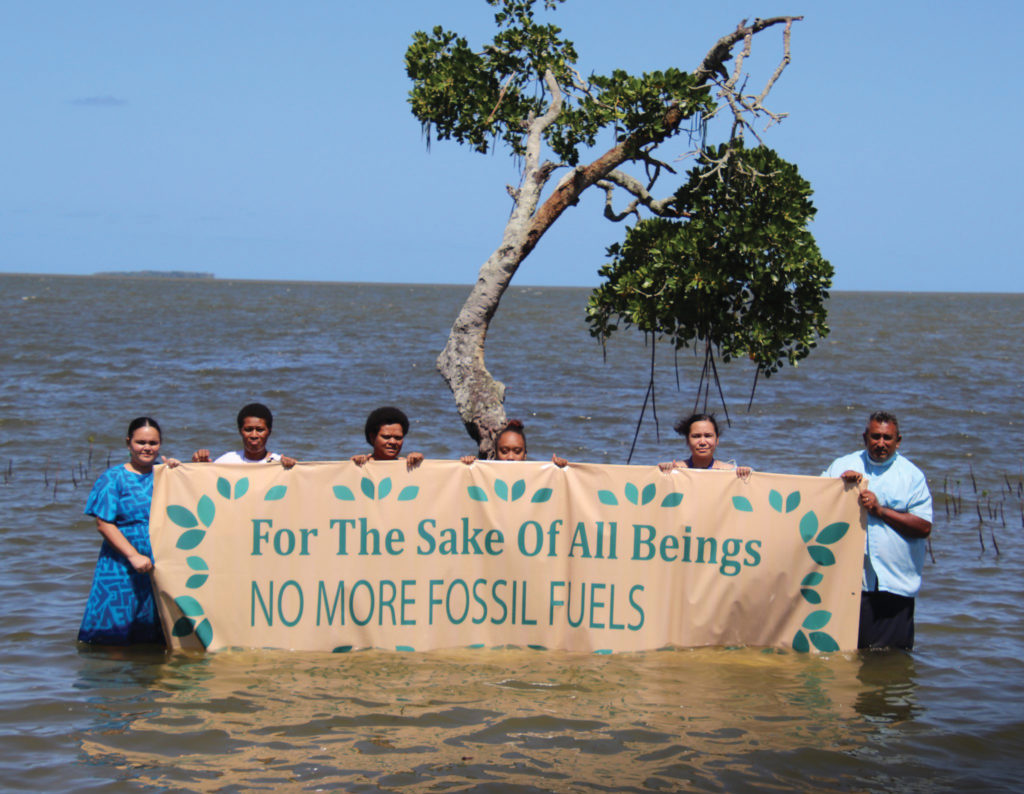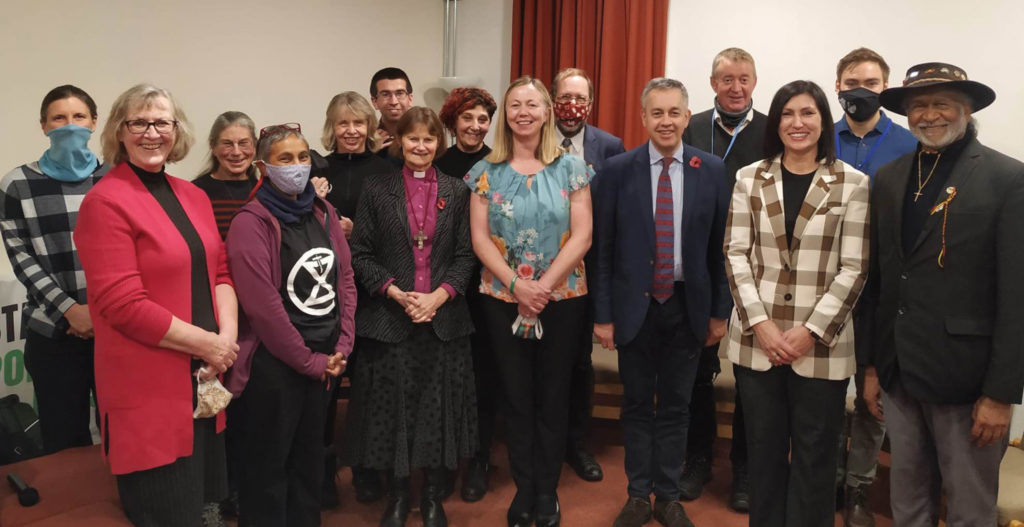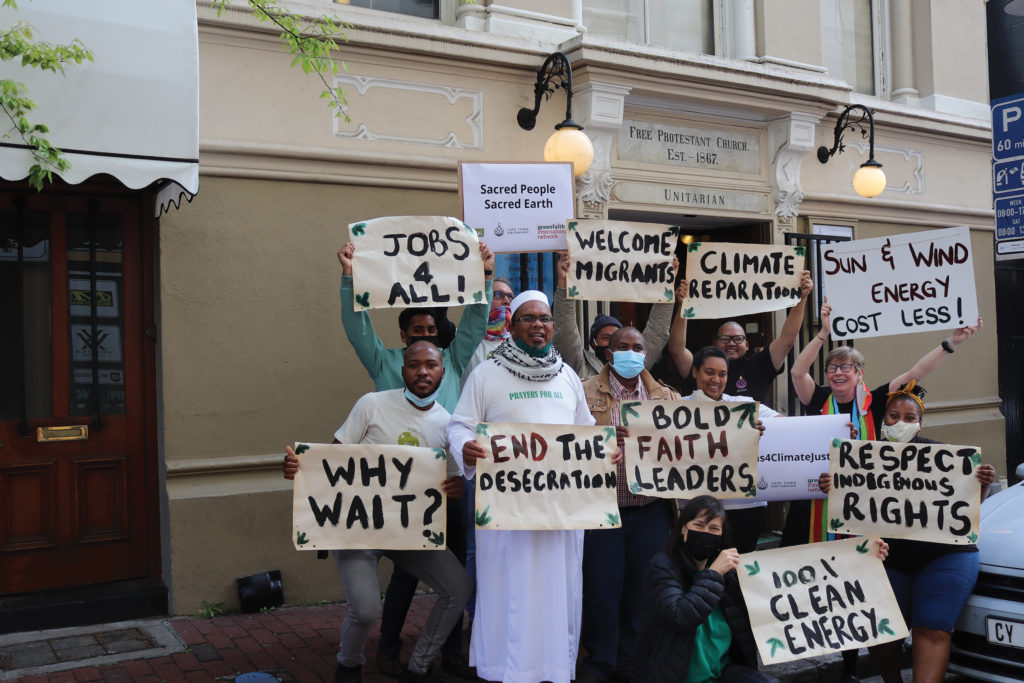SPECIAL REPORT • FAITHS AND CLIMATE CHANGE

Source: Petero Lalagavivi/ Green Faith International Network.
COP26, A LAST-MINUTE CALL
The climate crisis is upon the tipping point beyond which there will be accelerated and irreversible threats to our survival. Science has warned us with irrefutable evidence that climate change leads to potentially devastating effects on natural and human systems. Communities are facing widespread, adverse human, material, economic, and environmental effects that require immediate emergency responses
BY FRANCESCA DE GASPARIS | SOUTHERN AFRICA FAITH COMMUNITIES ENVIRONMENT INSTITUTE (SAFCEI)*, CAPE TOWN
ALL SACRED texts contain stories about how human beings have been instrumental in bringing about the suffering of all other living things. Various texts commonly found across faiths warn how human beings are, and will be, solely responsible for the destruction of creation. It is written in the Christian Bible, 2 Chronicles 7: 14: “If my people, who are called by my name, will humble themselves and pray and seek my face, and turn from their wicked ways, then I will hear from heaven, and I will forgive their sin, and will heal their land.”
We must seize this moment and put people and our sacred Earth over profit
As people of faith, we interpret this in our modern context to mean that human beings need to change their behaviour—dramatically and immediately. The climate crisis has been made even more stark with Covid-19, which has deepened the social challenges that our communities are facing. The pandemic has increased inequalities and continues to exacerbate the effects of climate change.
Obstacles to hearing the Global South
At this time when agreement and serious commitments are needed globally, Covid-19 has brought about greater logistical challenges for southern participants to attend the Conference of Parties26, and disparities in access to the vaccine and other resources have resulted in many community representatives, especially from the Global South, having great difficulties in attending the conference. Heavily impacted and poorly resourced communities become, therefore, excluded from discussions and decision-making processes at COP26, and out of sight and out of mind, their recognition is diminished. The voices of those who failed to be present physically are needed.\

can lead the way in divesting from fossil fuels. Source: Jonathon Braden/ laudatosimovement.org.
Covid-19 has provided yet further proof of the negative effects of our unbalanced relationship with nature and that our current priorities are distorted. This is an opportunity for a fundamental re-think and re-structuring of our broken systems in a people and planet-centred way. We must seize this moment and put people and our sacred Earth over profit. All of creation matters and must be allowed to thrive. Walking lightly on our shared planet should be at the forefront in all discussions, with all living things given due consideration as we strive to address climate change and achieve a balanced and green development that will bring climate justice.
Governments’ commitment
All governments need to enhance ambitions through Nationally Determined Contributions (NDCs) and implement the Paris Agreement. With the current NDCs, the world is not going to meet the required maximum average temperature increase of 1.5ºC. The impact of climate change is becoming more frequent, intense and widespread. Humanity is experiencing the devastating impacts of climate change through tropical cyclones of category five, flooding and droughts, and other extreme weather phenomena in our region. It is a real concern that the victims of climate disasters continue to be exposed to weakened economic and natural systems.

Source: Southern Africa Faith Communities Environment Institute (SAFCEI).
The worst affected are those who are least able to cope and have very little or no access to relief. Poorer developing countries are not getting their due funding for permanent and repairable climate damage caused mainly by other —the so called ‘loss and damage’— to enable them to recover.
Industrial agriculture and particularly the farming of animals is contributing significantly to climate change, but has hardly appeared on the COP26 agenda. Fossil fuel extraction continues to increase, especially on our continent, Africa.
Action on climate change is a matter of urgency, as words without real action are meaningless
Time does not allow us to wait any longer. Action on climate change is a matter of urgency, as words without real action are meaningless. To date, we have failed to see evidence of any significant ambition in amending the situation before climate consequences become irreversible. In fact, we are often witness to the opposite. It is alarming to see the weak response measures and transparency issues. It is the responsibility of our leaders to deliver on promises made in NDCs and the Paris Agreement—no more empty promises.
